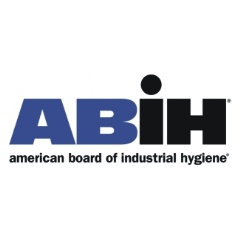Preventing Occupational Exposure Risks to Asphalt Fumes
The American Board of Industrial Hygiene® (ABIH®) reminds workers and industry of the need to protect employees from exposure to asphalt fumes.
It’s important to control workers’ exposure to protect their health and Certified Industrial Hygienists are uniquely qualified to do just that.
The Occupational Safety & Health Administration (OSHA) reports that over 500,000 workers are exposed to fumes from asphalt. Asphalt as it known in the United States, or bitumen, as it is called in many other parts of the world, is found in natural deposits or can be obtained by refining crude oil. The primary use of asphalt is for road construction where it is mixed with granular materials such as sand, gravel, or crushed stone. Asphalt is also commonly used to seal flat roofs and in waterproofing products.
Health effects from exposure to asphalt fumes include headache, skin rash, sensitization, fatigue, reduced appetite, throat and eye irritation, cough and skin cancer. OSHA states that exposure to asphalt fumes can cause serious injury and permanent damage and that those workers who may be exposed to asphalt fumes need to be aware of the potential hazards in their work environment.
According to the National Institute for Occupational Safety and Health (NIOSH), the complex chemical composition of asphalt makes it difficult to identify the specific component(s) responsible for adverse health effects observed in exposed workers. Known carcinogens have been found in asphalt fumes generated at work sites. Occurrences of acute irritation in workers from airborne and dermal exposures to asphalt fumes and aerosols, combined with the potential for chronic health problems, including cancer, warrant continued diligence in the control of exposures.
“Although OSHA proposed a permissible exposure limit in the early 1990s for asphalt fumes, one does not exist today,” said Susan Ripple, CIH® and Chair of ABIH®. “It’s important to control workers’ exposure to protect their health and Certified Industrial Hygienists are uniquely qualified to do just that. CIHs are trained to conduct risks assessments and other core competencies of the CIH® program include air sampling and instrumentational analysis; chemical and biohazards; engineering controls and ventilation; health risk analysis and hazard communication; and work environments and industrial processes. This knowledge and the proper use of personal protective equipment can be instrumental in reducing exposure risks to asphalt fumes and other potential workplace hazards.”
To learn more about the American Board of Industrial Hygiene®, Certified Industrial Hygienist® credential or to locate a CIH® to perform industrial hygiene services, please visit www.ABIH.org, email abih@ABIH.org or call (517) 321-2638.
About the American Board of Industrial Hygiene ®
Since 1960, ABIH®, a not-for-profit corporation, has been the world’s largest organization for certifying professionals in the practice of industrial hygiene. ABIH® is the premier credentialing body responsible for ensuring high-quality certification including education, experience, examination, certification maintenance and ethics enforcement. Currently, more than 6800 people in 32 countries are certified to use the CIH® designation.
( Press Release Image: https://photos.webwire.com/prmedia/12710/204842/204842-1.jpg )
WebWireID204842
- Contact Information
- Paul Cochrane
- President
- Cochrane & Associates, LLC
- Contact via E-mail
This news content may be integrated into any legitimate news gathering and publishing effort. Linking is permitted.
News Release Distribution and Press Release Distribution Services Provided by WebWire.
